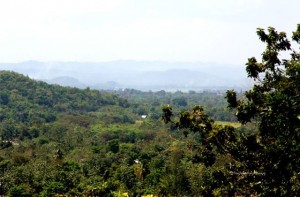
Bekuta, or in some literatures, Abekita, was a 19th Century settlement in the Waterworks country of Westmoreland, Jamaica, formed by a group of Yoruba slave descendants who were called Nagos. Bekuta was formed when indentured workers of Egba origin was brought to Jamaica. While a few followed through with their demand to be returned to their home country across the ocean, a large group became stranded, settling and giving birth to a new generation. Bekuta is the corrupted name of the city of Abeokuta in Nigeria, said in Soyinka‘s memoir, You Must Set Forth At Dawn to have been founded when slaves sought out a hilly terrain that would prove impenetrable for their pursuing owners.
The place, named Abeokuta by slaves because of its rockhills served to remind settlers of home, and one of the hills is said to share semblance, especially in its size with that of Olumo. Such was the poignant symbolism that Bekuta carries that visiting Fela Sowande, who was a renowned composer from Abeokuta in Nigeria broke down in tears, overwhelmed by it. During his visit, Sowande discovered a familiar ancient Yoruba hymn, “Amasunduwa,” which he had learnt as an enthomusicologist. He described Bekuta as looking like transplantations of areas of Abeokuta of his youth.
In the year 1990 when Wole Soyinka visited the dying town, he met a feeble relic and a story of how generations had preserved the tradition from homeland in Africa. The single old woman who kept the village alive had died by his second visit, and so Bekuta itself. The 13 acre Abeokuta Natural Park, having one of Jamaica’s oldest swimming pools and surrounded by a lush flora, was commissioned by the Nigerian High Commissioner on this site in 2003. Similar settlements are to be found in the northerly Hannover Parish, peopled by a Yoruba speaking group who identified themselves as Ettu in reference to their traditional reverence to ancestors, which like the people of Bekuta contrasts curiously with Orisha worship of the Yoruba slaves in the Americas





















